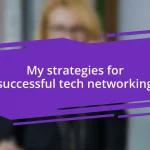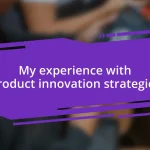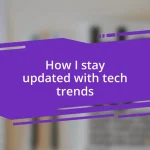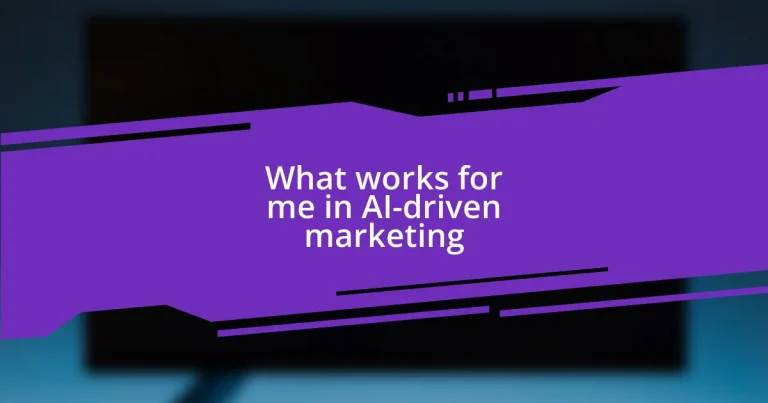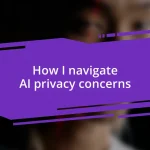Key takeaways:
- AI enhances marketing by providing data-driven insights, automating repetitive tasks, and enabling personalized customer experiences.
- Implementing AI effectively involves starting small with pilot tests, collaborating with IT, and staying informed on emerging trends.
- Successful AI marketing examples include Starbucks’ predictive analytics, Sephora’s AI chatbot, and Netflix’s recommendation algorithm, which all improve customer engagement and loyalty.
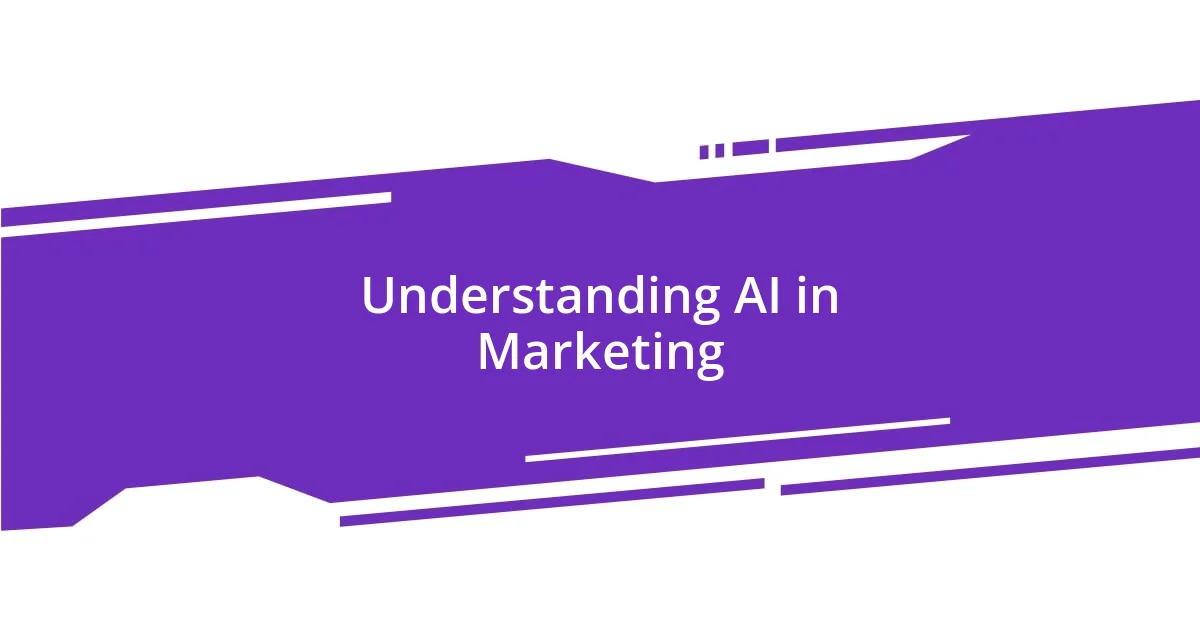
Understanding AI in Marketing
AI in marketing isn’t just about algorithms; it’s about understanding human behavior on a deeper level. I remember when I first used AI tools to analyze customer data—seeing patterns emerge in ways I hadn’t considered before really opened my eyes. It’s fascinating how these technologies can predict trends based on historical data, making it easier for marketers to tailor their messages to specific audiences.
Have you ever thought about how AI can enhance customer interactions? For me, implementing chatbots was a game changer. I was amazed by how they could assist customers 24/7, providing instant support and personalized recommendations, which not only improved customer satisfaction but also freed up my team to focus on more complex tasks. It struck me how much more connected we could be to our customers through these intelligent systems.
I find it exciting that AI doesn’t just streamline processes but also facilitates creativity in marketing. When I utilized AI-driven content creation tools, I felt a surge of inspiration as I could brainstorm ideas quickly and efficiently. It’s incredible to think that, with the help of AI, I was able to produce campaigns that resonated more deeply with my audience and sparked meaningful conversations. How could AI reshape your marketing strategies in ways you hadn’t imagined?
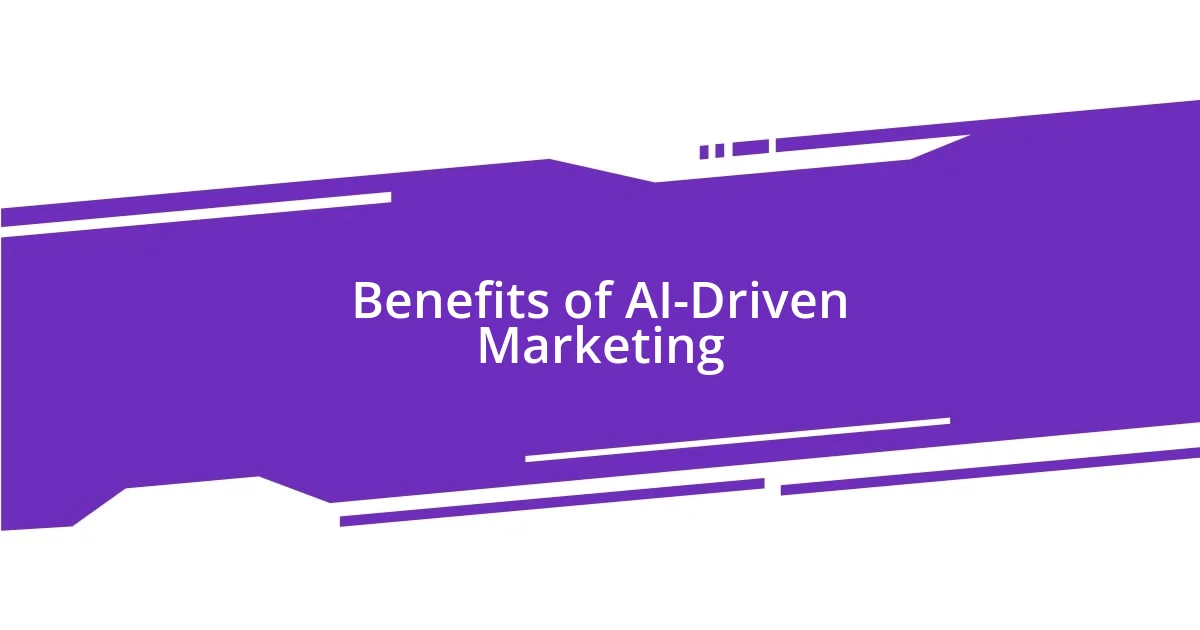
Benefits of AI-Driven Marketing
AI-driven marketing offers a multitude of benefits that can significantly enhance marketing strategies. One standout advantage is its ability to provide data-driven insights. I recall when I first dived deep into predictive analytics; the way the data revealed customer preferences was almost like having a crystal ball. Being able to anticipate what my audience wanted before they even realized it helped me create campaigns that truly hit the mark.
Moreover, automation is another game-changing aspect of AI marketing. I used to spend countless hours on mundane tasks like segmenting email lists or scheduling posts. Once I integrated AI tools into my workflow, I was amazed at how much time I saved. With AI managing the repetitive tasks, I suddenly had the freedom to focus on crafting more engaging and creative content rather than getting bogged down in the details.
Lastly, personalization has reached new heights with AI. I remember when I first used AI to tailor recommendations based on customer behavior—seeing the increase in engagement was thrilling! The feeling of knowing each customer received unique content that spoke directly to them brought a new layer of satisfaction to my marketing efforts. AI allowed me to cultivate a more profound connection with my audience, turning casual visitors into loyal customers.
| Benefits | Description |
|---|---|
| Data-Driven Insights | Anticipate customer preferences and trends through advanced analytics. |
| Automation | Streamline repetitive tasks for increased efficiency and focus on creativity. |
| Personalization | Create tailored customer experiences that foster loyalty and engagement. |
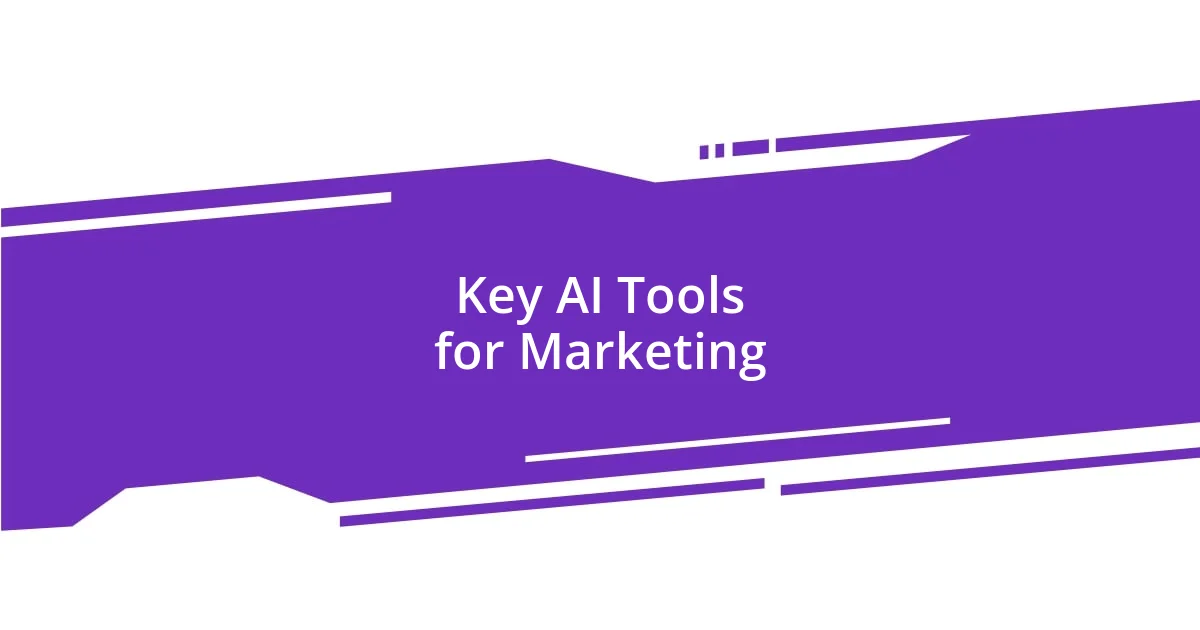
Key AI Tools for Marketing
When it comes to AI tools for marketing, I’ve found a few that truly stand out. One of my favorites is HubSpot’s Marketing Hub. I was impressed by how seamlessly it integrates AI into every aspect of my marketing strategy, from automating email campaigns to analyzing user engagement. The data visualization tools made it easy to grasp complex information, which I found incredibly satisfying. Another tool I’ve come to appreciate is Google Analytics, powered by AI. It transformed my data tracking, providing insights I never imagined were possible.
Here are some key AI tools that have made a difference for me:
- HubSpot Marketing Hub: Perfect for automating tasks and analyzing customer interactions.
- Google Analytics: Offers powerful insights for understanding user behavior patterns.
- Mailchimp: Utilizes AI for personalized email marketing campaigns that resonate with audiences.
- Canva’s Magic Write: An innovative tool for generating content ideas when I needed a creative spark.
- Salesforce Einstein: Empowers sales and marketing strategies with AI-driven predictions and recommendations.
These tools have not only saved me time but have also empowered me to be more strategic in my approach. Each one has brought something unique to my marketing toolkit, allowing me to connect with my audience in more meaningful ways.
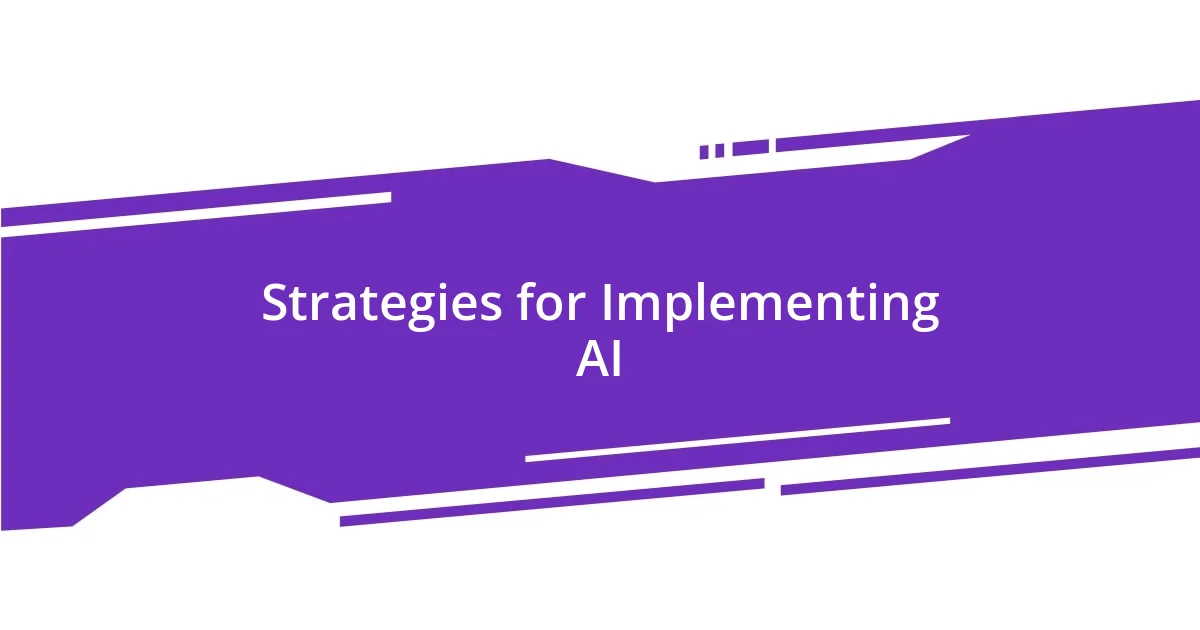
Strategies for Implementing AI
Implementing AI into your marketing strategy may seem daunting, but breaking it down into manageable steps can simplify the process. I remember the moment I decided to integrate chatbots into my customer service approach. Initially, I was cautious about how they would be received, but the instant response rate impressed both my team and my clients. It really opened my eyes to the potential of AI tools to enhance customer interaction.
Another strategy that worked wonders for me was conducting small-scale experiments before a full rollout. By piloting a targeted email campaign with AI-driven personalization, I could gauge its effectiveness without committing all my resources upfront. The significant surge in open rates from this test filled me with excitement and encouraged me to explore further applications of AI in my marketing tactics.
Collaboration with IT professionals also proved invaluable. When the technical aspects of AI integration felt overwhelming, I sought guidance from my tech-savvy colleagues. Sharing knowledge helped us build a robust framework for leveraging AI while ensuring that we tailored strategies to fit our unique audience. This collaborative effort not only eased my burdens but also fostered a team spirit that was empowering. Have you ever seen how teamwork transforms a challenging task into a fulfilling endeavor? It’s truly remarkable.
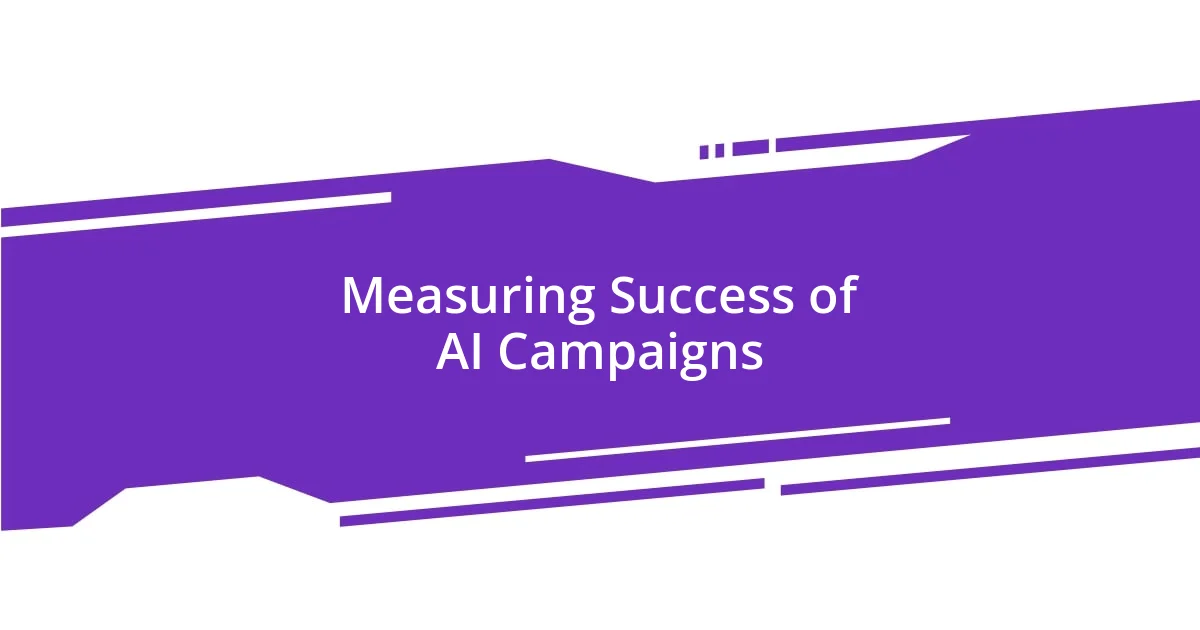
Measuring Success of AI Campaigns
Measuring the success of AI campaigns can feel like deciphering a puzzle, but I’ve learned that focusing on specific metrics makes it clearer. For instance, I always look closely at conversion rates after an AI-driven campaign launch. It’s fascinating how small tweaks can lead to substantial improvements; I once adjusted my targeting slightly and saw a dramatic uptick in conversions, which was incredibly validating.
Another critical aspect I’ve found valuable is tracking customer engagement through AI analytics tools. These tools provide real-time feedback, allowing me to adjust my strategies on the fly. I remember a time when I noticed a drop in engagement after a new email campaign. By diving into the data, I discovered the subject line was less appealing than I thought. Making those quick changes not only improved the immediate results, but also taught me about my audience’s preferences.
Don’t underestimate the importance of A/B testing, either. I often run controlled tests to see which content resonates best with my audience. It’s essential to compare different variables, such as headlines or images, to determine what truly connects. Seeing one version outperform another fills me with curiosity and excitement—what new insights will this uncover about my audience’s tastes? This hands-on exploration keeps me engaged and continually learning.
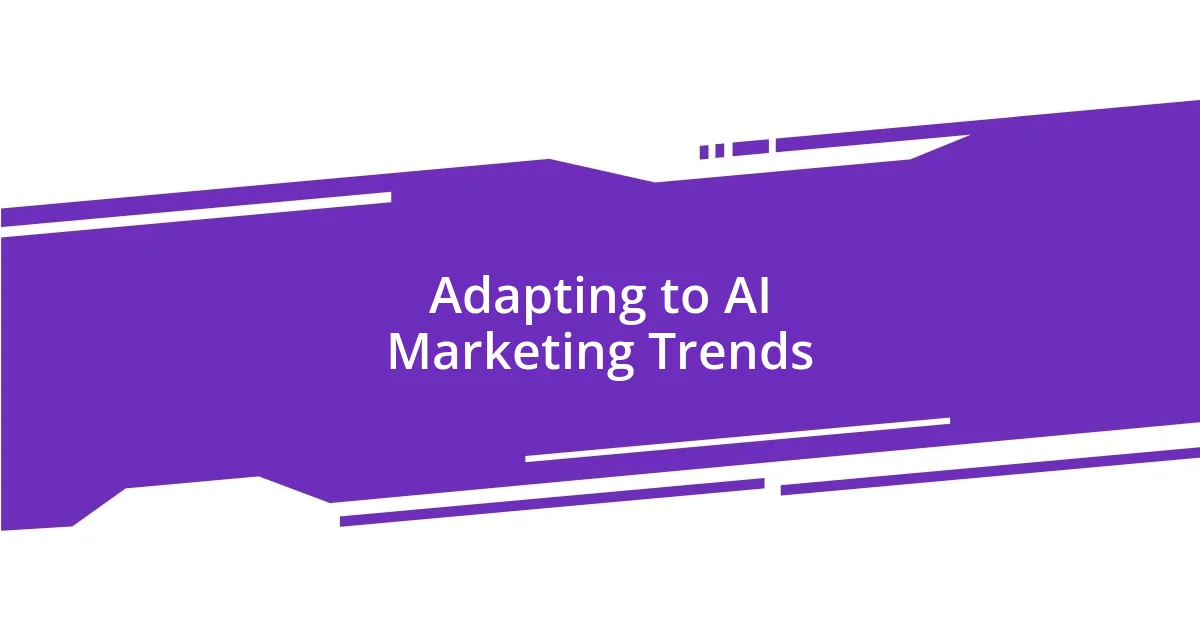
Adapting to AI Marketing Trends
Adapting to AI marketing trends requires both flexibility and a willingness to embrace change. I vividly recall a time when I hesitated to adopt machine learning techniques for audience segmentation. Once I took the plunge, though, I was amazed to see how accurately the system identified patterns I’d missed. It shifted my approach completely, allowing me to target my audience more effectively and deepen my connection with them. Have you ever felt that thrill when a change leads to unexpected breakthroughs? It’s an exhilarating journey!
Staying ahead of AI trends also means continuous learning. I often carve out time each week to read up on the latest advancements in AI and marketing strategies. For instance, after discovering how voice search optimization is impacting consumer behavior, I revamped my content strategy to include conversational keywords. This shift not only improved my site’s visibility but made me rethink how my audience interacts with my brand. Isn’t it fascinating how a simple adjustment can create ripples throughout your entire marketing approach?
Moreover, I’ve found that networking with like-minded professionals opens up fresh perspectives on AI marketing. Joining online forums and attending webinars not only enhances my knowledge but often leads to unexpected collaborations. I once partnered with a fellow marketer to co-create an AI tool that predicted customer preferences. The success of our project taught me the power of collective innovation. What about you? Have you considered how sharing ideas can ignite growth in your marketing strategy? It’s a game-changer!
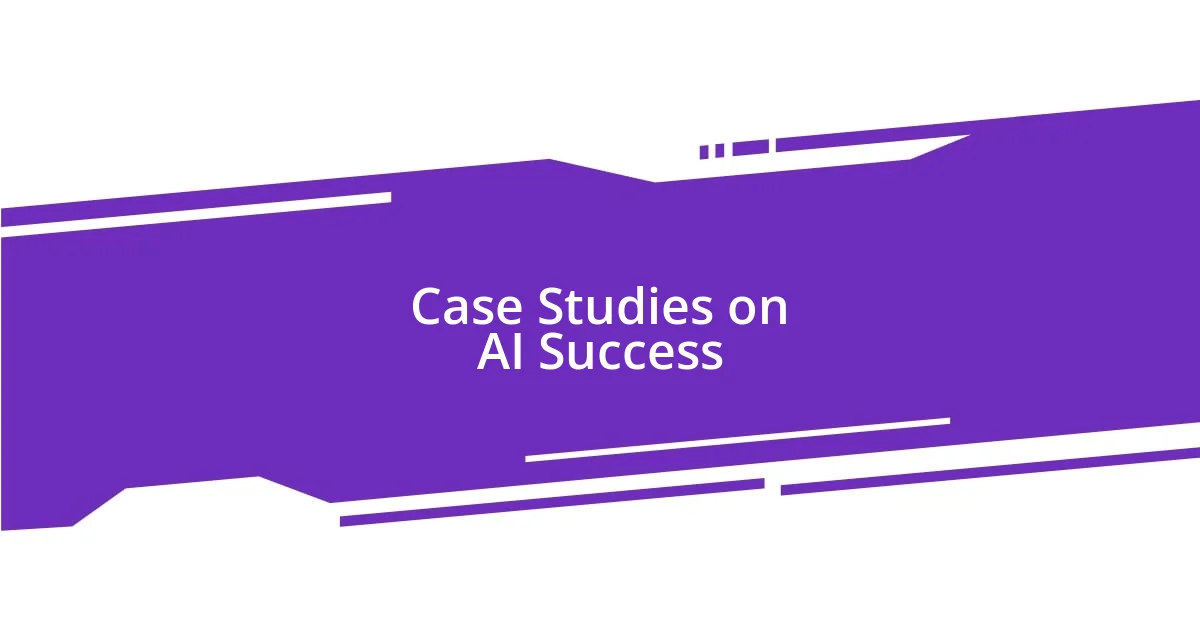
Case Studies on AI Success
When I think about successful AI marketing examples, one that stands out is Starbucks’ use of predictive analytics. They utilize AI to analyze customer data and craft personalized marketing campaigns, leading to a noticeable increase in sales. I remember my excitement upon receiving a customized offer tailored to my preferences—it felt like they knew me! This approach not only drives profits but also fosters customer loyalty, making clients feel valued and understood.
Another compelling case is Sephora’s implementation of an AI-powered chatbot. This tool enhances the customer experience by providing instant responses to beauty-related queries, which I found incredibly useful during my last shopping spree. It’s remarkable how AI can empower customers to make informed decisions quickly. I often wonder, how many potential customers do we lose by not providing such instant gratification? The success of Sephora’s chatbot certainly highlights the importance of accessibility in today’s fast-paced market.
Finally, I’m particularly intrigued by how Netflix employs AI to curtail churn and keep viewers engaged. Their recommendation algorithm is a masterclass in building user experience, as I find myself endlessly clicking through shows that align with my tastes. The intimate feeling that Netflix ‘gets me’ keeps me coming back for more, proving how effectively AI can enhance viewer loyalty. Have you had an experience where a recommendation made all the difference? That’s the magic of AI in marketing.
